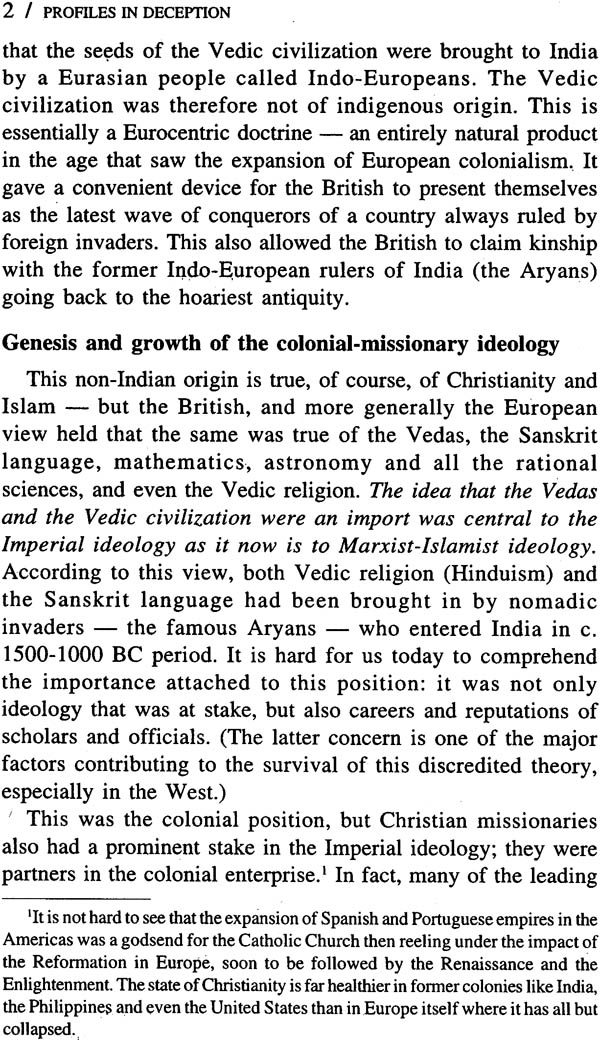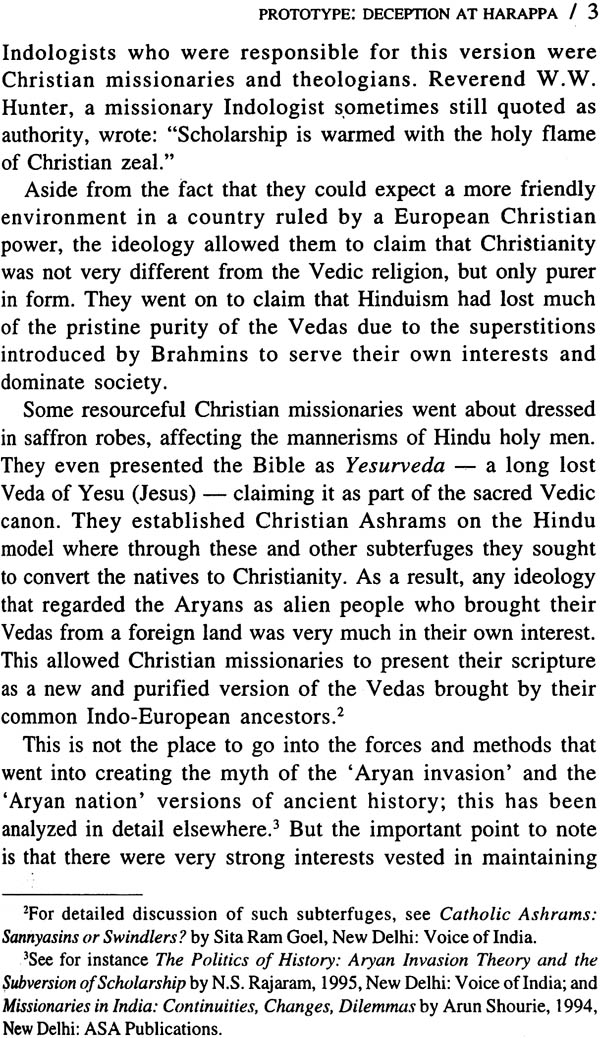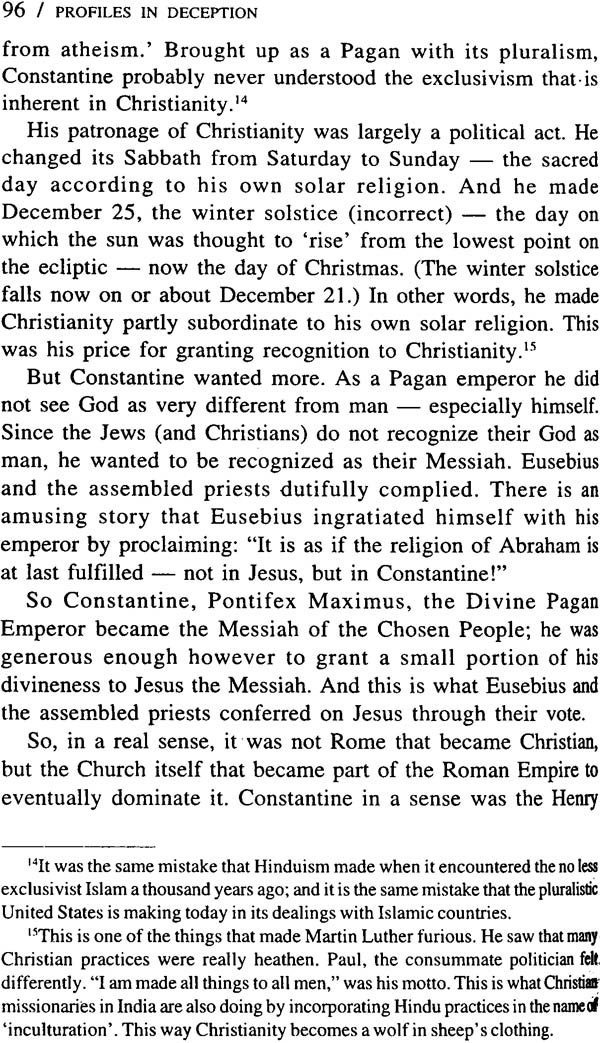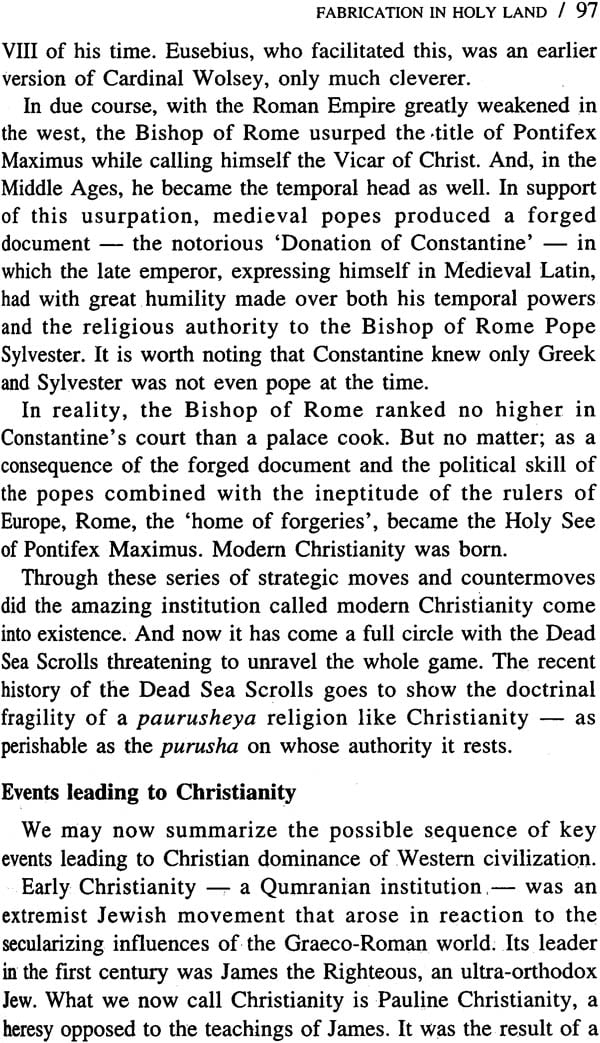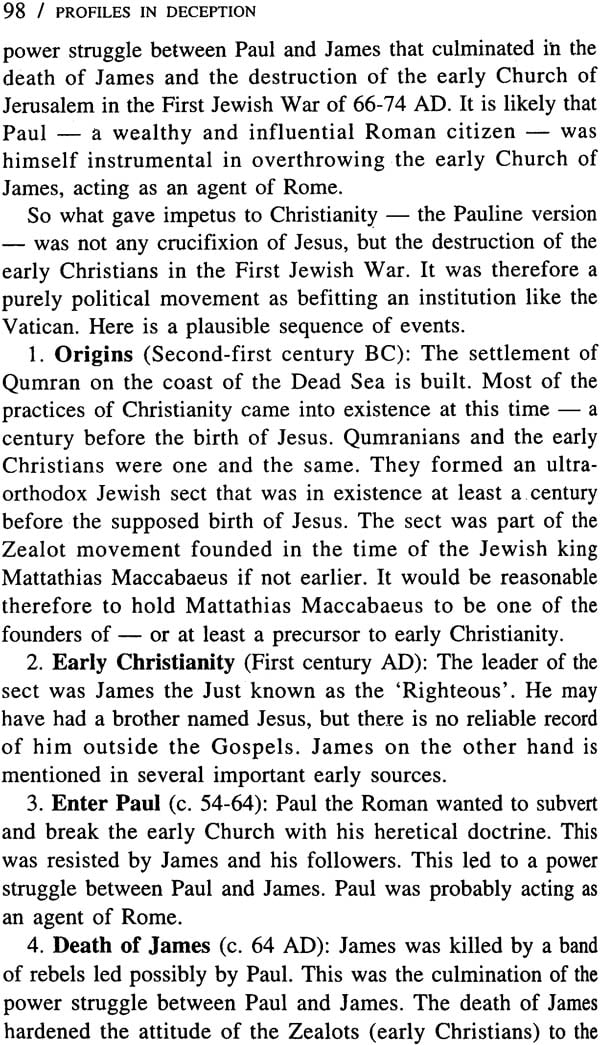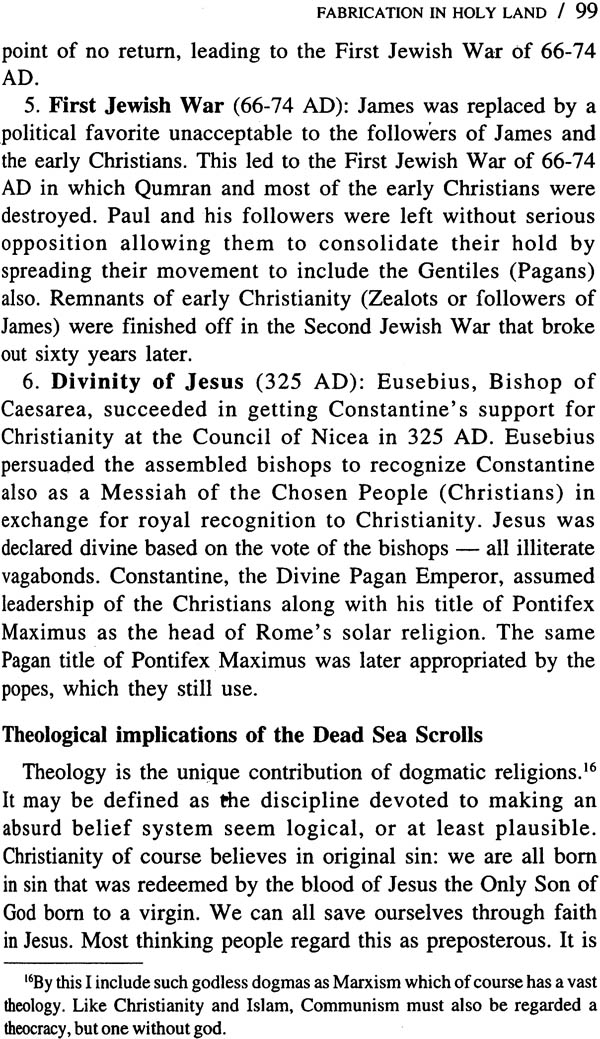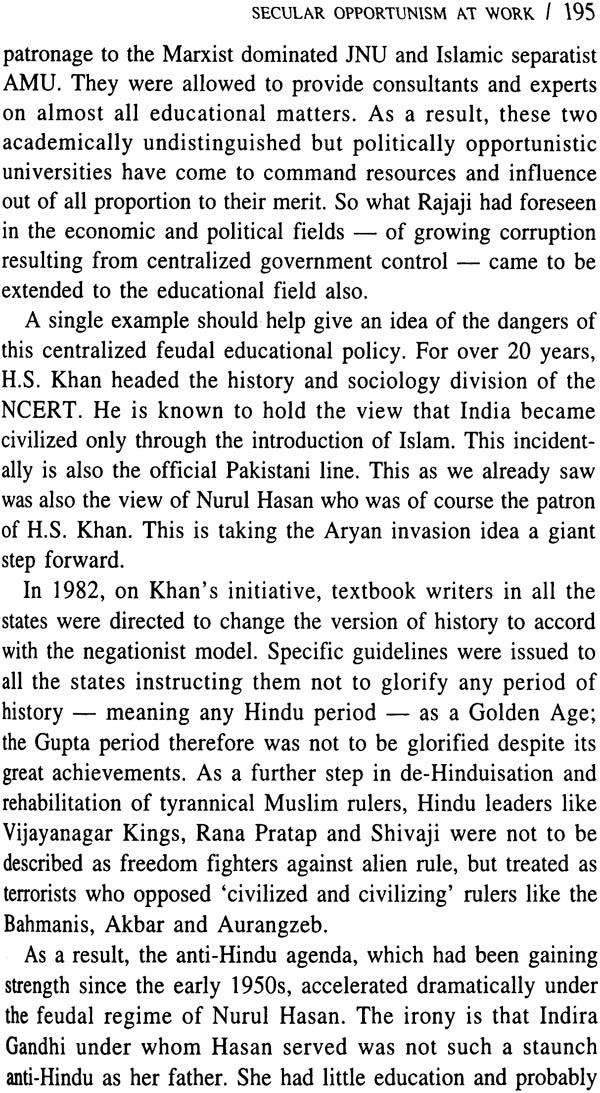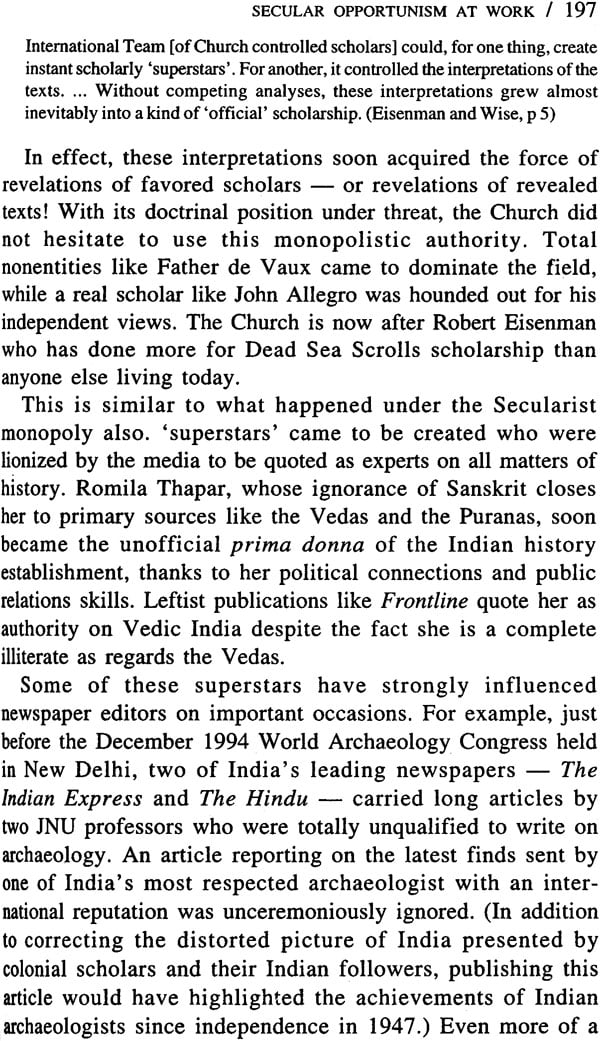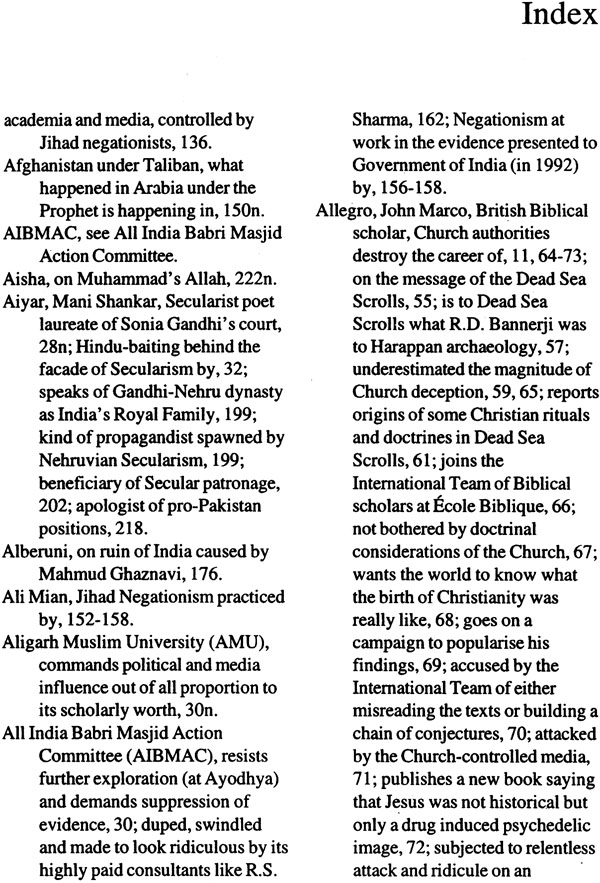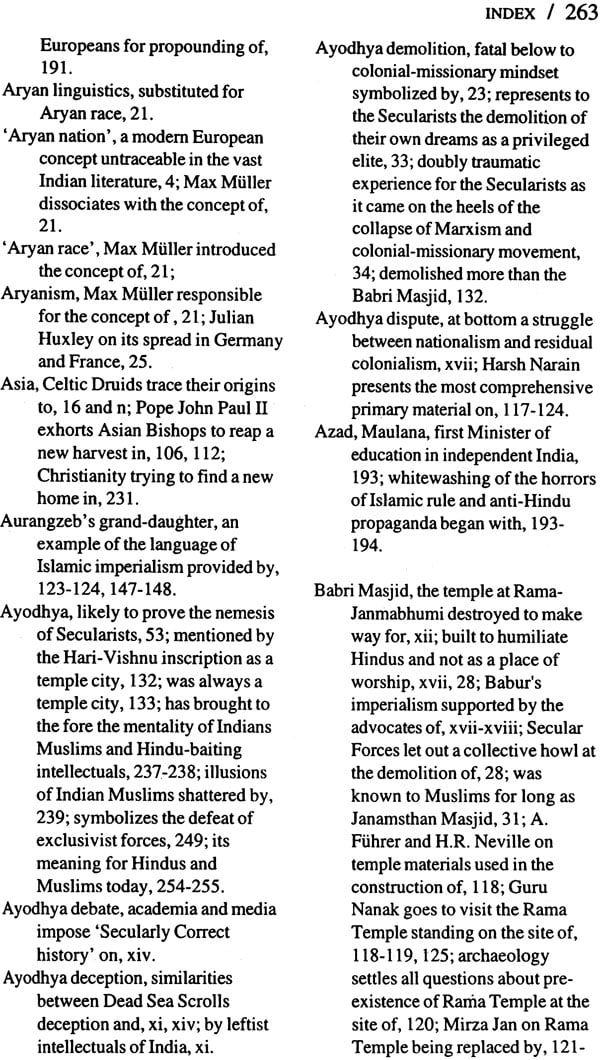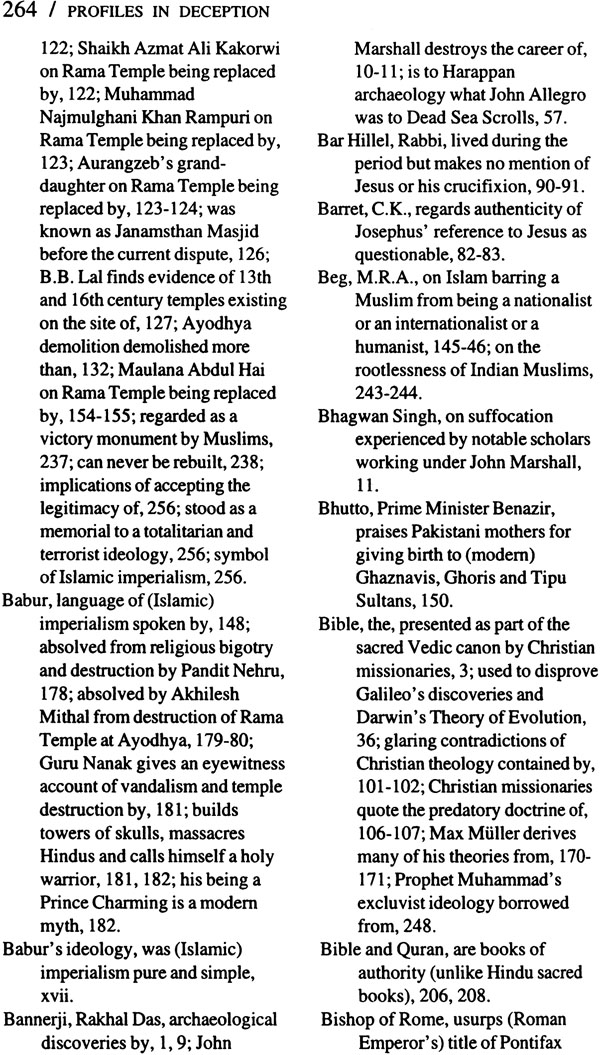
Profiles in Deception (Ayodhya and the Dead Sea Scrolls)
Book Specification
| Item Code: | NAM195 |
| Author: | N. S. Rajaram |
| Publisher: | Voice of India New Delhi |
| Language: | English |
| Edition: | 2000 |
| ISBN: | 8185990654 |
| Pages: | 316 |
| Cover: | Paperback |
| Other Details | 8.5 inch x 5.5 inch |
| Weight | 450 gm |
Book Description
The present book began as a work on the Ayodhya dispute. Upon examining the historical record, and the behavior pattern of the participants, we find that there are really two Ayodhya disputes: the first, about the right of possession to the sacred site known as Rarna-Janmabhumi; the second, about the historicity of the temple itself, whether it ever existed at all. The real conflict over Ayodhya is, therefore, over conflicting versions of history-one national and rooted in the soil, the other a mix of alien and imperialist ideologies controlled by an elite seeking to perpetuate itself. This is what the Ayodhya dispute is really about- not any destruction of a dilapidated mosque used by no one. All the hue and cry over the Ayodhya demolition is a diversion-a smokescreen to conceal the real agenda of this interest group. Deception has been its currency.
This book is about deception used as part of ideology and political control. It takes a close look at the systematic use of deception in propagating and maintaining political dominance as serving the cause of ‘high truths'-truths higher than verifiable facts and even opposed to them. The highest of high truths in India and one that is seen as being endangered by the developments at Ayodhya, is Nehruvian Secularism. The dogma of Nehruvian Secularism is a peculiar mix of Marxism, Euro-Colonialism and Islam. All three are imperialisms. The one thing that these three imperialisms have in common-inherited by the Secularists-is hatred of Hinduism. As inheritors of imperial values, the Secularists naturally see India's indigenous Hindu civilization-the source of its nationalism-as the dark force whose entire past history should be blackened beyond redemption and ultimately effaced. The first step is to coin a derogatory term for it - 'Hindu Communalism'. They see India as an impure land plagued by a pluralistic culture that awaits Secularist cleansing.
For this reason, though Ayodhya remains the central theme of the book, its scope has been expanded to cover the role and method of deception itself by examining three cases: the de-Aryanization of the Harappan civilization by colonial-missionary scholars and their Indian surrogates; the Secularist negation at Ayodhya; and the greatest deception of all-the Christian myth and the suppression of the Dead Sea Scrolls. The first of these, the de-Aryanization of Harappa, serves as a prototype in examining the other two; it is also an integral part of the imperialist agenda of distorting and destroying India's history-now taken up by the Secularists.
Recently, there have been some changes in the Indian intellectual scene also. The so- called Secularists are rapidly losing their hold over establishment institutions like the ICHR (Indian Council of Historical Research). Also, the publication of Arun Shourie's book Eminent Historians has dealt a blow to the credibility of many Secularist 'scholars', though the media has not been sufficiently forthright in its condemnation of their unscrupulous activities. The Secularists are unlikely to recover from this twin blow of the collapse of their historical theories and the exposure of their venality and dishonesty as scholars.
Dr. N.S. Rajaram was born in Mysore, India, in September 1943. He holds a B.E. degree in Electrical Engineering from B.M.S. College in Bangalore and Ph. D. in Mathematical Sciences from Indiana University in Bloomington, U.S.A. He is an internationally known researcher in Computer Science. For more than ten years, he was one of America's best-known workers in Artificial Intelligence and Robotics. He has been an advisor to several high technology companies in America and Europe. He has also been a consultant to NASA.
Since 1992, .he has been an independent researcher and author working on the history and science of ancient India. His work on Vedic Mathematics, relating it to the history of India. Egypt and Babylon is world- renowned. He is the author of several books on the subject including the highly acclaimed Vedic Aryans and the Origins of Civilization with David Frawley. His most recent work relates to the decipherment of the 5000 year-old Indus script done jointly with the great Vedic scholar Dr. Natwar Jha. His other books are on Secularism, Dead Sea Scrolls, Hinduism, Gandhi, and Rama-Janmabhumi at Ayodhya.
His columns on history, culture and current affairs have appeared in publications worldwide. He is one of the most widely read columnists in the world on India and her civilization. He lives in Oklahoma City, U.S.A. and Bangalore, India.
The present book began as a work on the Ayodhya dispute. My intention at first was to explore the underlying similarities between the Ayodhya deception and the Dead Sea Scrolls deception - the first by the Leftist intellectuals of India, and the second by the authorities of the Catholic Church. Upon examining the historical record, and the behavior pattern of the participants, it began to dawn on me that there are really two Ayodhya disputes: the first, about the right of possession to the sacred site known as Rama-Janmabhumi; the second, about the historicity of the temple itself, whether it ever existed at all.
The first dispute is of course ancient and historical, but the second dispute is of very recent origin. It is part of a much larger conflict over the imposition of a version of history on the people of India by certain interest groups embodying alien imperialistic values. As I describe in the book, it may be seen as the symbol of an ongoing battle between rising nationalism and residual imperialism. It is this second, or what may be called the 'dispute behind the dispute', that I have chosen to focus on in the present volume. I see it essentially as the last phase of India's past under imperialism - a struggle for survival by the agents and beneficiaries of defunct imperialisms. These are the ones operating under the cover of 'secularism'. As far as the right of possession is concerned, the record is clear. For more than four hundred years - from 1528 to 1980 and later-no one questioned the following basic fact: a temple was destroyed in 1528 at a site called Rama-Janmabhumi to make way for a mosque known as the Babri Masjid. Hindus, Muslims, British officials and foreign travelers-all are unanimous on this point. This now stands confirmed by archaeology, especially by new discoveries following the demolition of December 6, 1992. Over the centuries, the site changed hands several times, but the dispute has always been over the right of possession-never the historical fact of the existence of previous temples or their destruction.
It is only in the past twenty years or so that a new 'historical dispute' has been manufactured over. the existence of a temple at the site. This is part of an effort that seeks to erase a thousand years of brutally violent Islamic history and replace it with a sanitized version in conformity with the interests of a select few who came to dominate the national scene. As I see it, the real conflict over Ayodhya is over conflicting versions of history - one national and rooted in the soil, the other a mix of alien and imperialist ideologies controlled by an elite seeking to perpetuate itself. This is what the Ayodhya dispute is really about-not any destruction of a dilapidated mosque used by no 0lle. All the hue and cry over the Ayodhya demolition is a diversion-a smokescreen to conceal the real agenda of this interest group. Deception has been its currency.
More broadly, this book is about deception used as part of ideology and political control. I have called it Profiles in Deception; I could also have called it Fabrication and Negation - for these are the two themes underlying deception on a historic scale that I have tried to highlight. My goal is to take a close look at the systematic use of deception in propagating and maintaining political dominance as serving the cause of 'high truths' - truths higher than verifiable facts and even opposed to them. The highest of high truths in India and one that is seen as being endangered by the developments at Ayodhya, is Nehruvian Secularism.
In any field outside of politics and religion, such a high truth would be called a dogma or superstition and dismissed as absurd. But neither dogmatic religions nor exc1usivist political systems can exist without them. The dogma of Nehruvian Secularism is a peculiar mix of Marxism, Euro-Colonialism and Islam. All three are imperialisms -their values sponsored even after independence by a feudal court; they have now met defeat at the hands of Hinduism. The so-called Secularists are the native residue of these defunct imperialisms. The one thing that these three imperialisms have in common - inherited by the Secularists - is hatred of Hinduism. Speaking of them and their specially crafted language, Sita Ram Goel observes
| Preface: The Two Ayodhya Disputes | xi | |
| 1 | Prototype: Deception At Harappa John Marshall at Harappa | 1 |
| Genesis and growth of the colonial-missionary ideology | 2 | |
| John Marshall's dilemma | 9 | |
| Preserving the colonial-missionary model | 13 | |
| The odd couple: race and linguistics | 15 | |
| National tragedy | 22 | |
| Digression: science on the notion of race | 23 | |
| 2 | Secularist Agony at Ayodhya | |
| Ayodhya and the agony of Secularists | 27 | |
| Going beyond assumptions | 28 | |
| The Secularist agenda | 29 | |
| Ayodhya and the collapse of the Secularist agenda | 33 | |
| Genesis and growth of the Secularist elite | 38 | |
| The role of Pandit Jawaharlal Nehru | 45 | |
| The host and the parasite | 50 | |
| Secular seminarians | 51 | |
| 3 | The Deception of Deceptions | |
| Drad sea Scrolls and the Christian myth | 54 | |
| The discovery and the scandal | 56 | |
| The Scrolls monopoly and its collapse | 59 | |
| The persecution of Allegro | 64 | |
| 4 | Fabrication in Holy Land | |
| The changed picture of Christianity | 74 | |
| Contents of the Dead Sea Scrolls | 75 | |
| Son of God' and the 'Branch of David' | 77 | |
| Pierced Messih' and thethe crucifixion myth | 79 | |
| Historical records: no Jesus | 82 | |
| Jews blamed to please the Romans' | 85 | |
| Early Christianity had no 'Faith in Jesus' | 89 | |
| No Jesus in Roman records | 91 | |
| Constantine and Christianity | 94 | |
| Events leading to Christianity | 97 | |
| Theological implications of the Dead Sea Scrolls | 99 | |
| Summary: history, doctrine and theocracy | 104 | |
| Current state of the Church | 108 | |
| 5 | First Dispute: The Temple and the Mosque | |
| The First dispute | 115 | |
| Literary evidence | 116 | |
| Discoveries at the site II: The Hari-Vishnu inscription | 128 | |
| Summary of findings | 132 | |
| 6 | Second Dispute: Negationism at Ayodhya | |
| Background: partners in Negationism | 134 | |
| Negationism | 135 | |
| Defending the indefensible | 140 | |
| Jihad ideology as the root of destructiveness | 146 | |
| Negationists at work I: the Muslim reaction | 151 | |
| Negationists at work II: Seculary Correct masquerade | 158 | |
| The clown and the scholar | 162 | |
| Secularly Correct Scripture | 165 | |
| 7 | Secular opportunism at work | |
| Roots of Negationism: History according to Nehru | 169 | |
| Sanitizing history: from Ghaznavi to Babur | 175 | |
| Fertile ground for Secular opportunism | 183 | |
| Negationists: Anti-Hinduism as common ground | 186 | |
| Ideology as cover for for weak scholarship | 188 | |
| Secularist dominance in education | 193 | |
| Secularism and the media monopoly | 199 | |
| 8 | Political Dominance as Religion | |
| Spiritual freedom and religious authority | 207 | |
| Secular state in the Hindu tradition | 210 | |
| End to Negationism, no retribution | 216 | |
| Exclusivism: basis of Christianity and Islam | 220 | |
| Monotheism facilitates theocracy | 224 | |
| Prophetic religion is cult of personality | 229 | |
| 9 | "We Cannot Escape History" | |
| Symbolism of Ayodhya | 232 | |
| National symbols | 236 | |
| Imperial hangover I: shadow of Islamic imperial hangover I: shadow of Islamic imperialism | 239 | |
| Imperial Hangover II: fear of national awareness | 244 | |
| Alien anachronism | 250 | |
| A Biblical story | 253 | |
| "We cannot escape history" | 254 | |
| Conclusion: "A house divided" | 256 | |
| Selected Bibliography | 258 | |
| Index | 261 |

